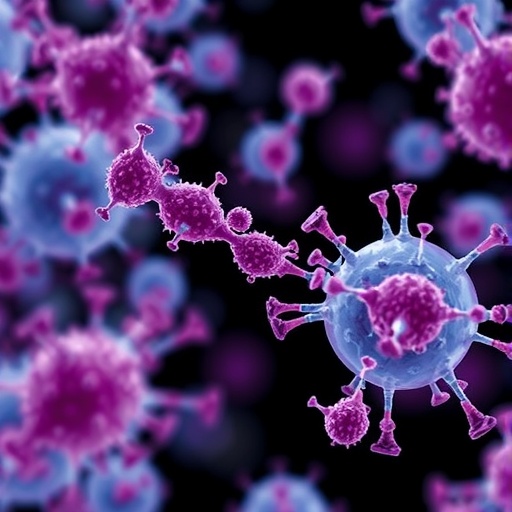In a groundbreaking development that could revolutionize clinical microbiology, researchers have unveiled CarbaDetector, a cutting-edge machine learning model designed to identify carbapenemase-producing Enterobacterales (CPE) with unprecedented accuracy from disk diffusion tests. This innovation addresses one of the most pressing challenges in infectious disease control: the rapid and reliable detection of antibiotic-resistant bacteria. Carbapenemase-producing Enterobacterales are notorious for their resistance to carbapenems, a class of antibiotics considered last-resort treatments for multidrug-resistant infections. The emergence and spread of these resistant pathogens pose a significant threat to global health, making the advancement of diagnostic methodologies not just desirable but essential.
Traditional methods for identifying CPE have long relied on phenotypic assays such as disk diffusion tests, which involve assessing bacterial growth inhibition zones around antibiotic-impregnated disks. While widely used, these assays have limitations including variability in interpretation, delayed results, and occasional false negatives or positives, which can complicate clinical decision-making. The development of CarbaDetector leverages the power of machine learning algorithms to analyze and interpret disk diffusion data with superior precision, potentially transforming routine laboratories’ ability to rapidly flag resistant organisms and inform timely treatment strategies.
At its core, CarbaDetector integrates image processing techniques with sophisticated classification algorithms, trained on vast datasets of disk diffusion test results correlated with confirmed carbapenemase production. By converting visual inhibition zone patterns into quantifiable features, the model can discern subtle phenotypic signatures indicative of resistance. This nuanced approach surpasses human visual inspection, which can miss or misinterpret critical variations. Such advancement not only streamlines workflow but also minimizes subjectivity, fostering reproducibility and standardization across laboratories worldwide.
The research team meticulously compiled extensive datasets encompassing diverse Enterobacterales strains from multiple clinical settings. This heterogeneity in data is crucial for building a robust model capable of generalizing across varying bacterial populations and antimicrobial resistance profiles. By employing state-of-the-art machine learning frameworks, the team trained and validated CarbaDetector, demonstrating it could outperform traditional interpretative guidelines and conventional automated systems in detecting carbapenemase producers. Importantly, it maintained high sensitivity and specificity, critical parameters for minimizing both false alarms and missed detections.
One of the cornerstones of CarbaDetector’s success lies in its adaptability to real-world laboratory conditions. Unlike models requiring specialized equipment or complex procedures, it functions seamlessly with standard disk diffusion tests, the most ubiquitous phenotypic susceptibility test worldwide. This compatibility ensures that even resource-limited laboratories, which often face constraining budgets and lack access to molecular diagnostics, can adopt CarbaDetector without costly infrastructure upgrades, thus broadening its global impact.
The innovative model’s development also underscores the growing convergence of artificial intelligence and microbiology. By harnessing computational power to interpret biological data, CarbaDetector exemplifies how AI can address nuanced biological problems with precision exceeding human capabilities. This paradigm shift holds promise for numerous applications beyond antibiotic resistance detection, suggesting a future where machine learning becomes integral to infectious disease diagnostics and surveillance.
Moreover, CarbaDetector’s ability to provide rapid results aligns with the urgent need for timely antimicrobial stewardship interventions. Delays in recognizing resistant infections often lead to inappropriate antibiotic use, exacerbating resistance spread and compromising patient outcomes. The model’s swift and reliable detection could enable clinicians to tailor antibiotic therapy promptly, optimizing treatment efficacy while curbing the unnecessary use of broad-spectrum agents.
The team behind CarbaDetector envisions several practical implementations. Beyond immediate diagnostic utility, their model could be embedded within laboratory information systems, assisting microbiologists in automated reporting and flagging high-risk isolates for further analysis. Additionally, integrating such technology into epidemiological surveillance frameworks could enhance tracking of resistance trends, fostering proactive public health responses.
Validation across multiple healthcare settings highlights CarbaDetector’s robustness. Extensive testing on retrospective and prospective datasets confirmed its consistent performance, signaling readiness for clinical adoption. The researchers emphasize the importance of collaboration between developers, clinicians, and microbiologists to ensure smooth integration into existing workflows and to tailor system updates responsive to emerging resistance mechanisms.
Despite the model’s impressive capabilities, the research acknowledges existing challenges. Continuous updating of training datasets is essential to accommodate evolving bacterial genetics and novel resistance determinants. Furthermore, rigorous quality control in laboratory procedures remains critical to maintain data integrity feeding into the model, as errors upstream can propagate inaccuracies despite AI analysis.
Beyond technical merit, the introduction of CarbaDetector symbolizes a shift toward precision medicine in infectious diseases, where diagnostics are finely tuned to pathogen biology, facilitating targeted interventions. This advancement reflects the broader trend of embedding artificial intelligence within healthcare, a fusion poised to accelerate discovery and improve patient care outcomes globally.
As resistance to carbapenems escalates worldwide, innovations like CarbaDetector offer a beacon of hope. By marrying microbiological expertise with cutting-edge AI, this tool has the potential to safeguard the efficacy of critical antibiotics and stem the tide of hard-to-treat infections. Success in deployment could inspire similar approaches for other resistance phenotypes, fostering a new era of smart diagnostics that evolve alongside microbial threats.
The broader implications of CarbaDetector extend into regulatory and policy spheres as well. Demonstrating that AI-driven diagnostics can meet stringent clinical standards may pave the way for streamlined approvals and incorporation into standard care protocols. This can accelerate access to advanced diagnostic technologies, particularly in regions disproportionately burdened by resistant infections but lacking molecular testing capabilities.
In conclusion, CarbaDetector encapsulates the transformative power of artificial intelligence to reshape infectious disease diagnostics. Through meticulous data-driven model development and validation, this machine learning tool redefines the capabilities of routine disk diffusion testing, enabling rapid, accurate identification of carbapenemase-producing Enterobacterales. Its potential to improve clinical outcomes, enhance antimicrobial stewardship, and support global public health efforts marks a significant milestone in the ongoing battle against antibiotic resistance.
Subject of Research: Machine learning application for detecting carbapenemase-producing Enterobacterales from disk diffusion antibiotic susceptibility tests.
Article Title: CarbaDetector: a machine learning model for detecting carbapenemase-producing Enterobacterales from disk diffusion tests.
Article References:
Muhsal, L.K., Cimen, C., Sattler, J. et al. CarbaDetector: a machine learning model for detecting carbapenemase-producing Enterobacterales from disk diffusion tests. Nat Commun 16, 10023 (2025). https://doi.org/10.1038/s41467-025-66183-z
Image Credits: AI Generated
DOI: https://doi.org/10.1038/s41467-025-66183-z
Tags: antibiotic resistance threat mitigationantibiotic-resistant bacteria identificationCarbaDetector AIcarbapenemase detection technologyclinical microbiology advancementsdisk diffusion test analysisEnterobacterales resistance mechanismsinfectious disease control solutionsmachine learning algorithms for diagnosticsmachine learning in microbiologyprecision medicine in bacterial infectionsrapid diagnostic methods for infections





